6 Tips for Overcoming Common Challenges in B2B Video Recording
Video content is a B2B company's go-to tool for engaging audiences, showing off products, and driving sales - all because of its retention value. Marketing and sales teams use all sorts of videos to get their message across, like webinars, product demos, customer testimonials, explainer videos, interviews with industry experts, and training sessions. But creating good videos isn't all smooth sailing. There are plenty of challenges to tackle, from tight budgets and time crunches to pesky technical glitches and keeping things professional.
In this article, we're diving into some practical tips to help you tackle these obstacles head-on and create top-notch video content that hits the mark with your audience.
1. Budget Constraints
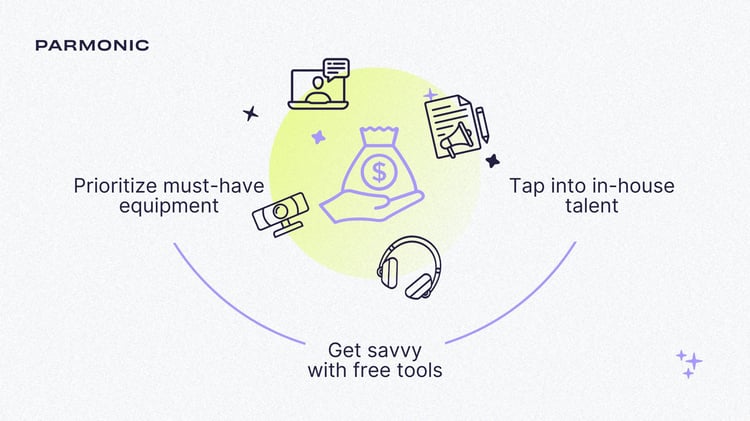
Challenge: It's known that a big chunk of budgets usually gets earmarked for paid acquisitions and on-site events. This often means there's not much left to invest in webinars or videos. With limited funds, it's tough to invest in top-notch equipment or professional editing, which can seriously impact the quality of your videos.
Tips for Overcoming:
- Prioritize must-have equipment: Even on a tight budget, focus on essentials like a decent camera, microphone, and lighting setup to elevate your recordings.
- Get savvy with free tools: Explore affordable or free recording software like Zoom and Microsoft Teams to enhance your video content without blowing your budget. Be sure to set your recording preferences to capture videos in high definition (HD). If you're using Zoom, clickherefor the settings. For MS Teams, clickhere.
- Tap into in-house talent: Utilize internal resources within your organization for production tasks to cut down on outsourcing costs.
2. Time Limitations
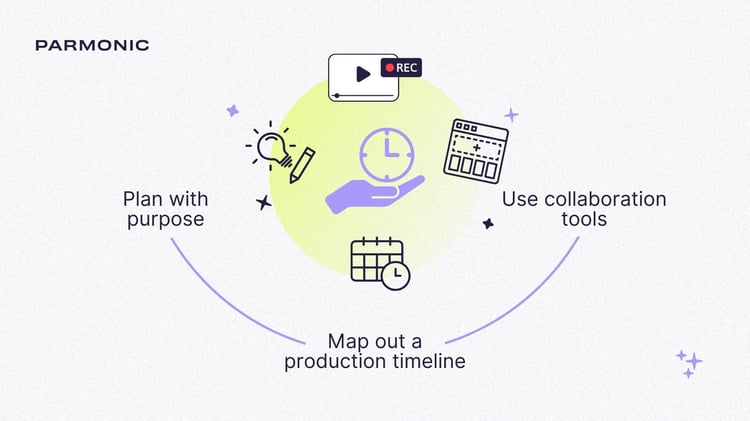
Challenge: Marketing and sales teams are constantly juggling deadlines and competing tasks which makes it tough to carve out enough time for planning, recording, and editing B2B videos effectively.
Tips for Overcoming:
- Plan with purpose: Create an annual calendar of videos and break it down into quarterly and monthly tasks. Set clear objectives and priorities for your video content, ensuring you focus on key messages and audience needs to streamline the process.
- Map out a production timeline: Break down tasks and allocate specific time slots for planning, recording, and editing to maximize efficiency. There are tools like Zoom, GoTo Webinar, andZuddlthat you can use to manage webinars and events across the entire lifecycle.
- Lean on templates and assets: Take advantage of pre-designed templates, graphics, and animations to speed up editing and reduce turnaround time. You can use Parmonic to convert your long videos into bite-sized content in minutes, create trailers, and even glamorize the videos as per your brand guidelines.
3. Logistical Constraints
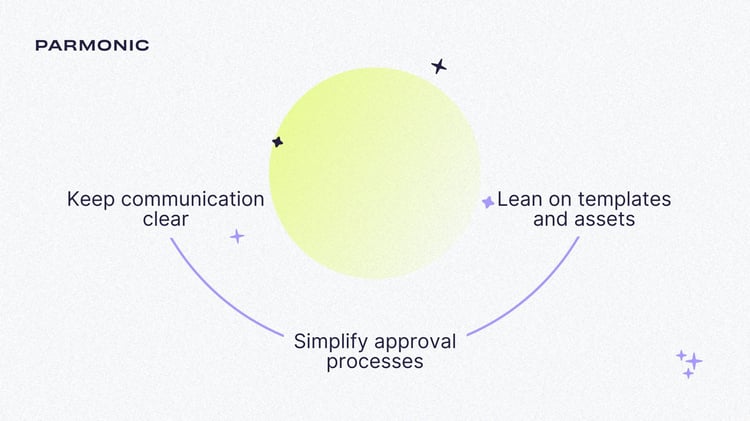
Challenge: Coordinating schedules with external speakers and aligning internal resources can pose logistical challenges when planning and executing webinars, training sessions, and customer testimonials among other videos.
Tips for Overcoming:
- Keep communication clear: Maintain open channels with all stakeholders to ensure alignment and minimize miscommunication throughout the production process.
- Simplify approval processes: Implement efficient workflows and designate key decision-makers at every point to speed up the review and feedback process, avoiding delays.
- Use collaboration tools: Use online platforms and project management tools like Notion, Slack, or Evernote to streamline communication and task management, especially for remote teams.
4. Technical Issues
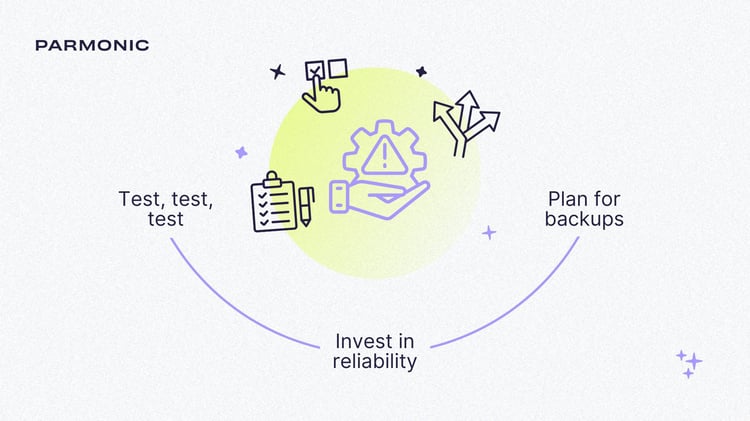
Challenge: Technical glitches like audio hiccups or connectivity problems can disrupt recording and impact video quality.
Tips for Overcoming:
- Test, test, test: Before recording, Always do a dry run with the speaker a day before to familiarize them with the setup and log in at least thirty minutes before on the day of the recording to check equipment, internet connection, and software to catch and address any technical issues early.
- Invest in reliability: Prioritize investing in dependable equipment and software to minimize the risk of technical failures during recording. You can find our list of recommended gadgets here.
- Plan for backups: Have contingency plans and alternative setups ready in case of technical difficulties, ensuring you can pivot smoothly if needed.
5. Maintaining Professionalism
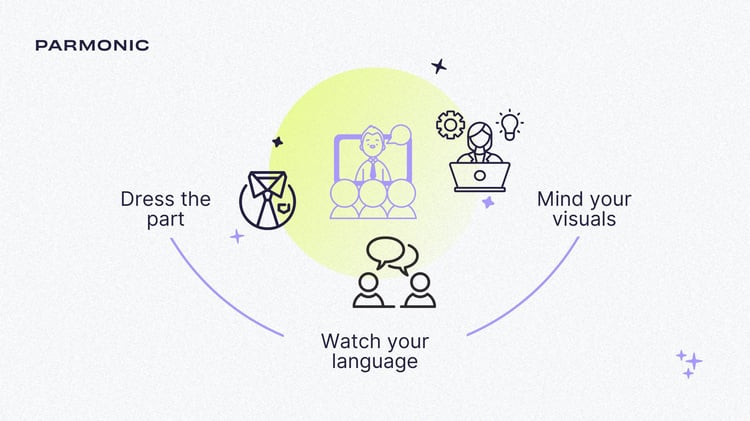
Challenge: Maintaining a professional image in front of prospective buyers and customers is essential for credibility, but it can be challenging in B2B settings.
Tips for Overcoming:
- Dress the part: Wear professional attire that aligns with your brand and audience expectations to set the right tone.
- Watch your language: Keep your language and tone professional throughout your video content, avoiding slang or jargon that may detract from your credibility.
- Mind your visuals: Ensure your background, lighting, and overall presentation are polished and reflect a professional image. Use a background with your brand's logo on it instead of the free templates available in the video hosting tools.
6. Engagement and Attention
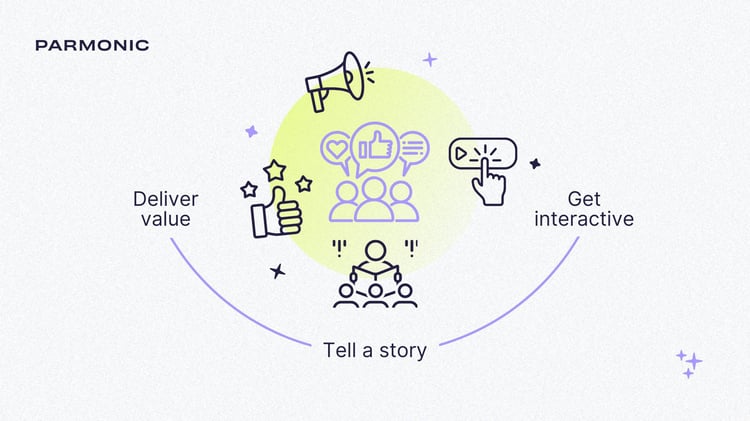
Challenge: Your buyers are busy. Add to it the low attention span and you'll realize that keeping them engaged throughout the video can be tricky.
Tips for Overcoming:
- Deliver value: Focus on providing valuable, relevant content that addresses the needs and pain points of your audience to keep them engaged.
- Tell a story: Incorporate storytelling elements to make your content more relatable and captivating, fostering emotional connections with your audience.
- Get interactive: Include interactive elements like polls or calls to action, or ask questions to encourage viewer participation and maintain engagement throughout the video.
With careful planning and setting processes, you can efficiently create and distribute high-quality video content that resonates with your audience, drives engagement, and helps you convert leads into opportunities.


